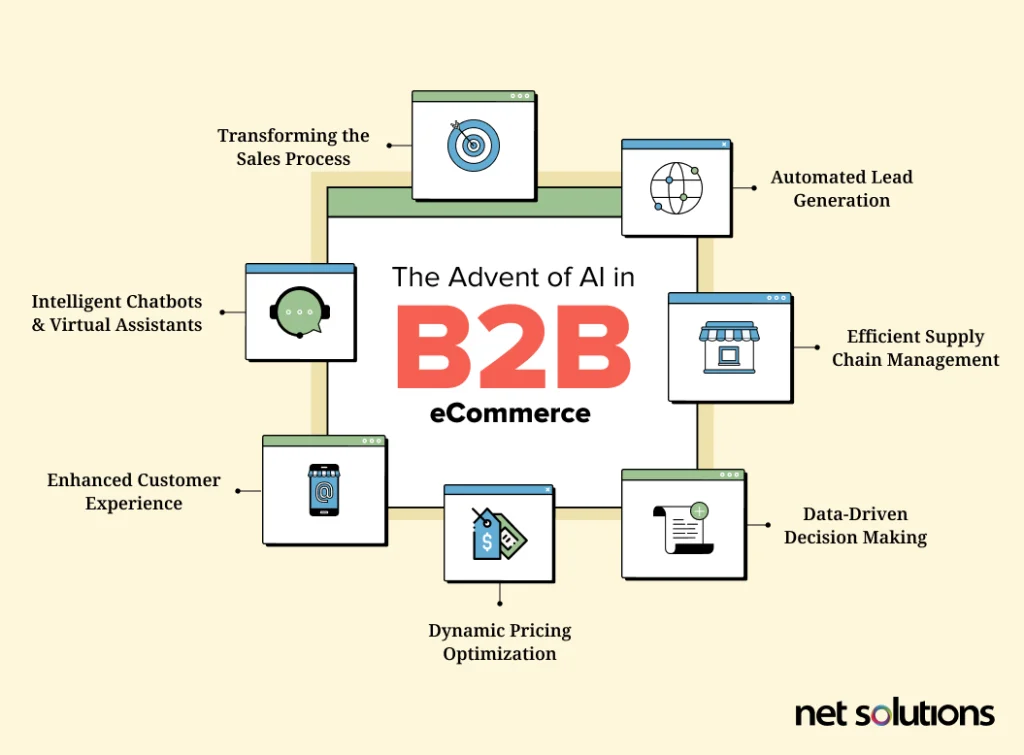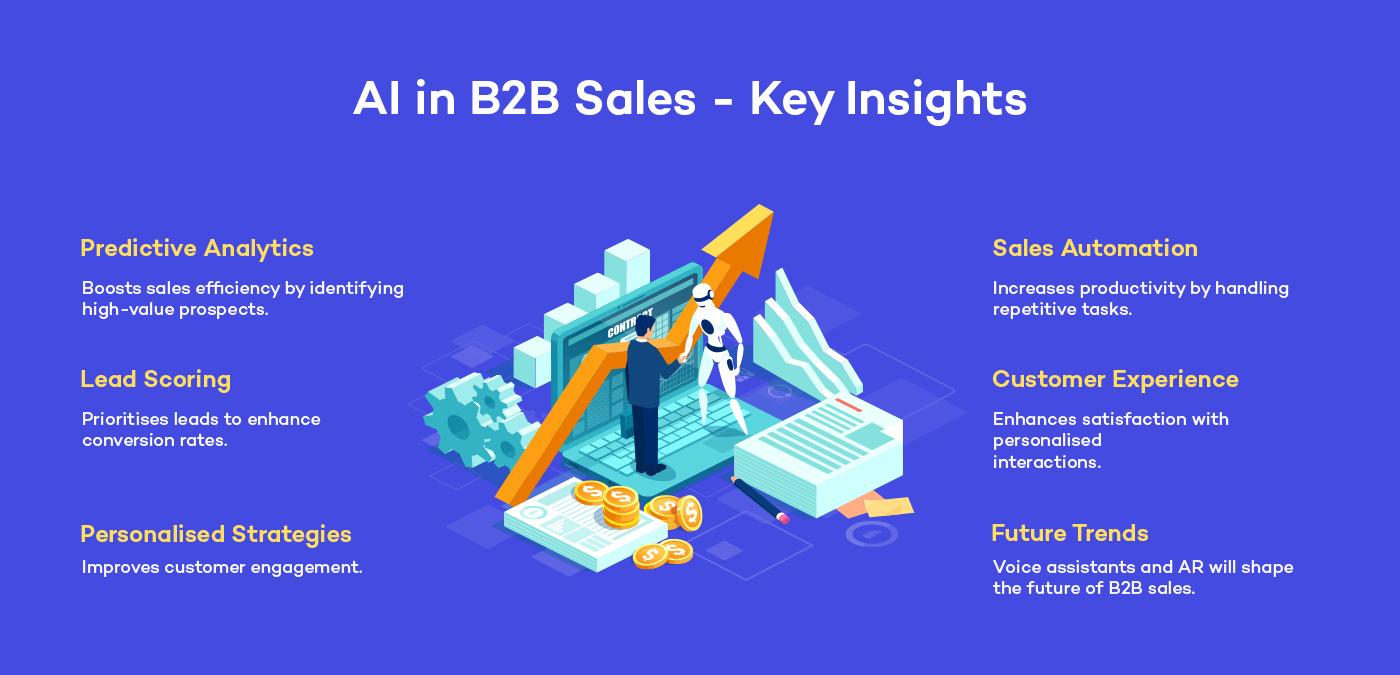The Future of B2B: Using AI Automation to Drive Success
The landscape of B2B is shifting as companies progressively turn to AI automation for critical benefit. This improvement assures to boost effectiveness and client engagement through innovative technologies. The assimilation of these devices is not without its obstacles. Recognizing exactly how services can browse this developing surface will certainly be necessary for future success. What factors will identify the effectiveness of AI in this sector? The responses may redefine typical organization versions.
Understanding AI Automation in B2B
As organizations increasingly look for efficiency, recognizing AI automation in B2B comes to be essential. AI automation refers to the use of expert system technologies to boost and simplify organization procedures. In the B2B industry, this includes the combination of AI devices to manage tasks such as information analysis, customer interactions, and supply chain operations. By leveraging maker understanding and natural language handling, companies can boost accuracy, decrease human mistake, and speed up decision-making (Minarik AI). AI automation facilitates the handling of huge volumes of data, making it possible for businesses to draw out important insights and maximize their operations. As organizations browse this technological landscape, a complete grip of AI automation's capacities will equip them to remain responsive and competitive to market demands
Secret Advantages of AI Automation for Companies
While numerous organizations grapple with enhancing operational needs, AI automation provides countless advantages that can noticeably enhance their performance. One significant advantage is efficiency; AI systems can carry out repetitive tasks much faster and with higher accuracy than people, consequently lowering errors and freeing up staff members for even more calculated initiatives. Furthermore, AI automation enables data-driven decision-making by evaluating vast datasets promptly, giving insights that inform organization techniques. Expense reduction is another vital advantage, as automation decreases labor prices and enhances resource allocation. AI can enhance scalability, permitting organizations to adapt to market adjustments swiftly. Ultimately, the combination of AI automation promotes technology, making it possible for business to remain affordable in a swiftly developing landscape.
Changing Customer Experiences With AI
AI is improving consumer experiences by making it possible for tailored communications and enhancing engagement. With the application of predictive analytics, businesses can expect client requirements and choices, bring about a lot more customized services. In addition, simplifying support processes with AI innovation improves efficiency and complete satisfaction, ultimately transforming the total consumer journey.
Individualized Communications and Engagement
Customized interactions have actually become a keystone of efficient customer interaction in the B2B landscape. By leveraging AI-driven remedies, services can tailor their interaction and offerings to meet the distinct requirements of each client. Automated systems examine client habits, choices, and data, allowing companies to create personalized experiences that reverberate with their audience. This degree of personalization not just boosts client complete satisfaction but likewise cultivates long-term commitment. Additionally, AI tools facilitate real-time interactions, enabling companies to respond quickly and properly to queries and responses. Therefore, companies can develop stronger partnerships with clients, ensuring that their services line up with evolving expectations. Ultimately, individualized engagement through AI brings about boosted outcomes and sustained success in the competitive B2B market.
Anticipating Analytics Execution
As organizations significantly look for to boost consumer experiences, executing anticipating analytics has become an essential technique in the B2B industry. By leveraging data-driven insights, companies can anticipate consumer needs and preferences, allowing them to customize their offerings extra efficiently. Anticipating analytics makes use of innovative algorithms and historical data to forecast future actions, enabling organizations to identify potential obstacles and possibilities. This positive method not only enhances customer contentment but additionally promotes commitment by providing timely and pertinent options. In addition, predictive analytics helps in resource allotment, making certain that advertising and marketing initiatives are concentrated on high-value potential customers. Eventually, the combination of predictive analytics gears up B2B business with the devices needed to transform customer interactions and drive long-lasting success in a significantly competitive landscape.
Improving Assistance Procedures
Enhancing consumer experiences in the B2B sector extends past anticipating analytics; streamlining support processes plays a necessary role. By incorporating AI-driven options, organizations can boost and automate regular questions response times, bring about enhanced client fulfillment. Chatbots and online aides supply 24/7 assistance, resolving client needs without delay and decreasing the worry on human representatives. This automation permits teams to focus on complex problems, promoting more meaningful communications. In addition, AI tools can evaluate assistance information to determine trends and areas for renovation, ensuring constant enhancement of service high quality. As companies take on these modern technologies, they position themselves as responsive and customer-centric, eventually driving loyalty and company development in a significantly competitive landscape.
Simplifying Procedures and Processes
Improving procedures and processes in B2B environments is crucial for boosting total effectiveness. By optimizing workflow performance and automating routine jobs, companies can minimize hands-on mistakes and free up useful resources. This shift not just boosts efficiency but likewise enables groups to concentrate on critical campaigns that drive development.
Enhancing Process Effectiveness
Enhancing process effectiveness is crucial for services seeking to reduce operational expenses and enhance performance. By assessing existing processes, companies can determine traffic jams and redundancies that hinder performance. Implementing structured procedures boosts communication and collaboration among groups, ensuring that tasks are completed a lot more quickly. Utilizing data-driven understandings enables firms to make educated decisions that fine-tune procedures better. Additionally, embracing integrated technologies can help with seamless information circulation, lessening the danger of hold-ups and mistakes. As services welcome these modifications, they not just foster a more dexterous work setting however additionally place themselves to react promptly to market demands - Growth Systems For B2B. Ultimately, concentrating on process effectiveness allows organizations to assign resources properly, driving long-term success in a significantly competitive landscape
Automating Routine Tasks
Several organizations are increasingly turning to automation to handle routine tasks, acknowledging its potential to substantially enhance functional effectiveness. By releasing AI-driven remedies, business can enhance recurring activities such as information entrance, invoice handling, and customer inquiries. This change not just minimizes human error but additionally liberates important staff member time, allowing team to concentrate on value-added tasks and strategic campaigns. Additionally, automation can enhance feedback times and solution consistency, leading to improved customer complete satisfaction. As companies browse an affordable landscape, leveraging automation for regular tasks becomes essential for keeping and maximizing operations dexterity. Ultimately, this strategy fosters advancement and drives development, placing companies for long-lasting success in the developing B2B setting.
Enhancing Decision-Making Via Data Insights

Getting Rid Of Obstacles in AI Execution
Although AI application holds the guarantee of substantial operational renovations, organizations commonly deal with a myriad of obstacles that can prevent progress. Secret obstacles consist of information quality concerns, as lots of ventures deal with incomplete or irregular datasets required for efficient AI training. In addition, resistance to change within the labor force can impede the fostering of AI modern technologies, as employees may be afraid work displacement or lack the required abilities. Budget plan restrictions also provide an obstacle, limiting financial investment in the called for facilities and ability. Furthermore, integrating AI systems with existing procedures can be intricate, requiring substantial time and sources. Getting rid of these obstacles requires a calculated technique that consists of complete training, modification administration, and a dedication to continuous enhancement in AI efforts.
Future Fads: The Next Frontier in B2B Automation
While the landscape of B2B automation continues to progress, arising patterns are positioned to redefine how organizations run. The integration of sophisticated synthetic knowledge will certainly assist in much more personalized client experiences, enabling organizations to tailor services specifically to client requirements. Additionally, the surge of predictive analytics More hints will allow organizations to expect market changes and enhance decision-making processes. Automation of regular jobs with robot procedure automation (RPA) will improve effectiveness, minimizing functional prices substantially. Furthermore, the adoption of blockchain innovation guarantees boosted transparency and security in purchases. As these developments gain grip, firms will significantly utilize AI-driven insights to foster partnership, streamline supply chains, and boost total productivity, marking a transformative change in the B2B landscape.
Regularly Asked Concerns
What Kinds Of Organizations Can Benefit Most From AI Automation?
Production, logistics, and client solution organizations can benefit most from AI automation. These markets improve operational efficiency, lower costs, and improve customer interactions, ultimately causing raised efficiency and earnings in a competitive market.
Just How Can Local Business Carry Out AI Automation Successfully?
Small companies can carry out AI automation efficiently by determining repeated tasks, choosing user-friendly devices, ensuring sufficient training for staff members, and gradually integrating remedies to enhance process while checking performance and changing approaches based upon comments.
What Are Common Mistaken Beliefs Regarding AI in B2B?
Usual false impressions regarding AI in B2B include the idea that it is just for huge business, that it assures instantaneous results, and that it can fully change human decision-making instead of increasing it. Growth Systems For B2B.
Just How Does AI Automation Effect Worker Roles and Work Safety And Security?
AI automation improves worker duties by simplifying recurring jobs, promoting efficiency and technology. While some fear work loss, it commonly produces chances for upskilling and new placements, ultimately boosting work safety via added value and productivity.
What Skills Are Needed to Handle AI Automation Projects?

As companies significantly look for effectiveness, understanding AI automation in B2B becomes vital. AI automation promotes the handling of big quantities of data, enabling companies to remove useful insights and maximize their operations. While many organizations grapple with increasing operational demands, AI automation presents countless advantages that can markedly boost their efficiency. Automation of routine tasks via robotic process automation (RPA) will enhance performance, lowering functional costs considerably. Manufacturing, logistics, and customer service organizations can benefit most from AI automation.